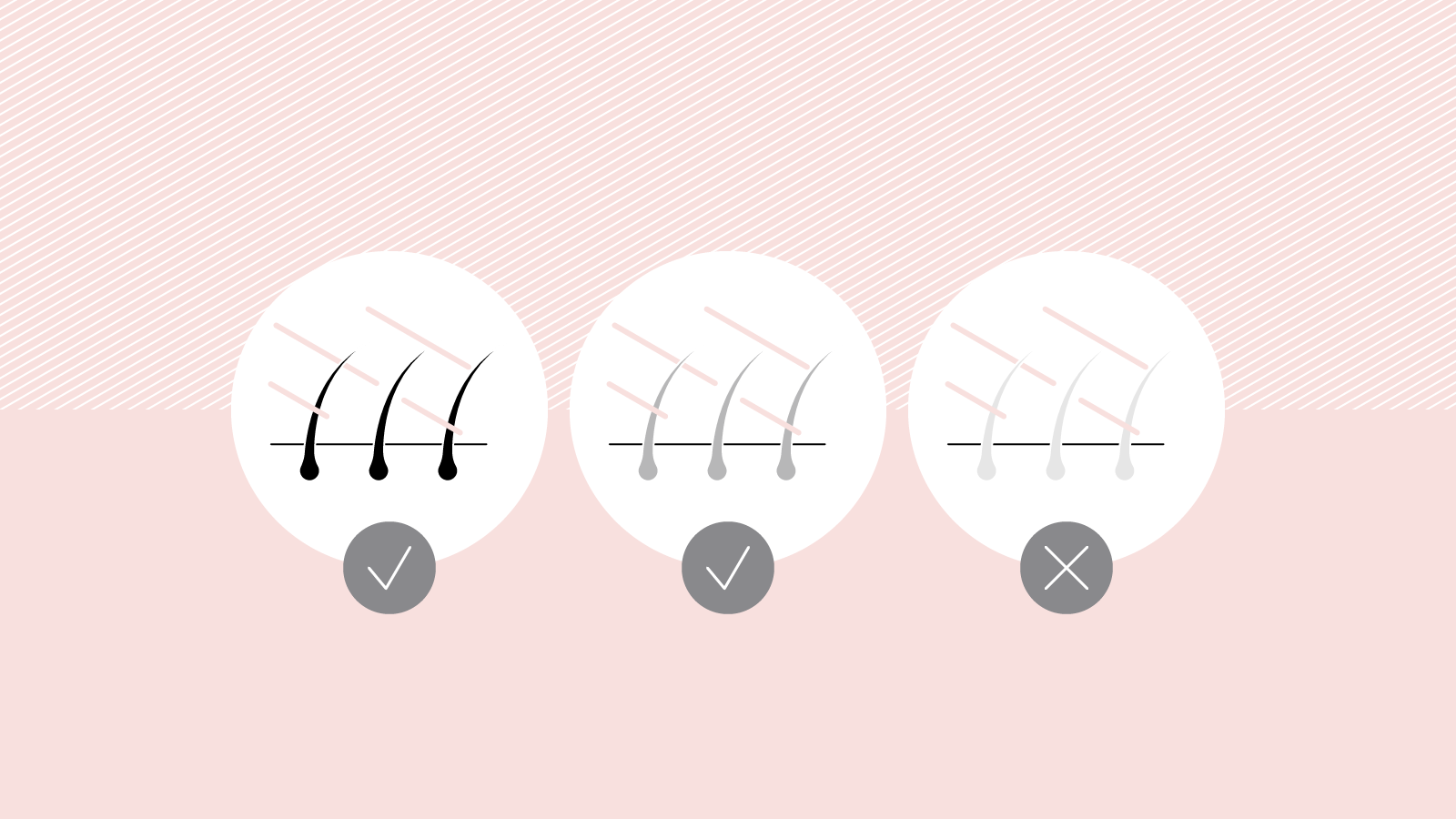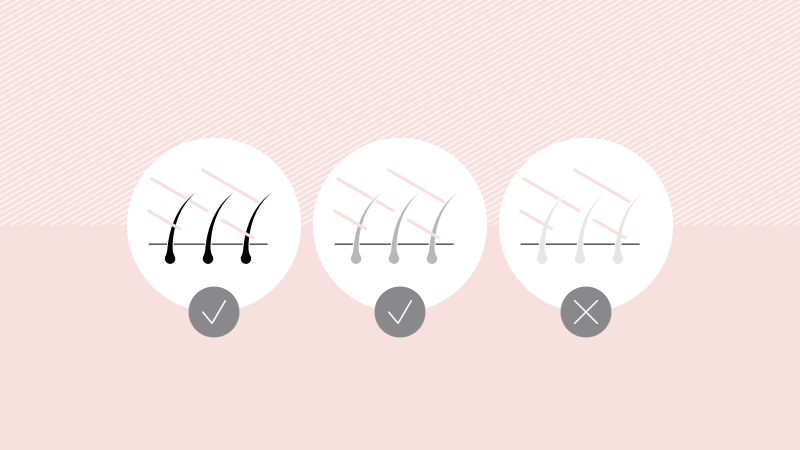Am I suitable for laser hair removal?
For laser hair removal to work there are a few things that ensure you suitable for treatment.
Most importantly, you must have dark hair?
Hair must contain some level of brown pigment (melanin) to respond to laser. Blonde, grey or red hair will not respond therefore cannot be treated. It is important to allow some hair to be present in the treatment area on the day of your consultation. This way we can confirm it has enough pigment.
Laser will work best when thick, brown/black hair is present in the treatment area. This is due to a bulk source of melanin contained within the hair. This makes it easier for the laser to successfully target it. Laser will also target medium to fine dark hairs but these hairs may be slower to respond.
Skin type doesn’t matter … but …
It may take more sessions to achieve a result on a dark skin. Dark skin contains an abundance of melanin so a different wavelenght of laser is needed. To treat dark skin safely we use an Nd:YAG laser. This method filters the laser energy into the skin while protecting it. This wavelength is targeted toward the blood supply that nourishes the hair root. This can be a slightly slower process but is much safer for dark skin. Because this wavelenght works differently it is more gentle on the skin while still targeting the hair.
For paler skin we use an Alexandrite laser, this laser is designed to absorb into melanin. As the laser pulses over the skin it will absorb into anything that has dark pigment. It delivers energy quite rapidly when it comes into contact with the pigment contained within the hair. Because the pale skin does not contain any pigment it remains unaffected. Because of the contrast between skin and hair this is very safe.
Some medications will prevent treatment
Many medications are fine to take when having laser treatment However some are not suitable to take while having laser as they can cause the skin to become sensitive to light (photosensitive). These medications can cause changes at a cellular level. These types of medications cannot be taken while having laser treatment. If you are currently taking any medication and would like to know if you are suitable please contact us. We can check these for you and confirm if you are suitable or not. In certain circumstances, we may advise you to inform your GP that you are starting treatment and ask for a letter of consent to begin treatment. This is to ensure we are 100% safe to proceed.
We operate under strict guidelines for your safety. If your medical circumstances change during the course of your treatments it’s important to let us know. This way we can make adjustments to your treatment plan if needed.
At Urbana your safety comes first.
No tan present, real or fake
Your skin must be free from tan (including fake tan) to be safely treated with laser. This is essential to ensure you receive a safe and effective treatment.
When we tan our skin cells produce melanin, this is a very important process as it protects our internal DNA structures beneath our skin.
The light and heat omitted by lasers targets and absorbs into melanin quite quickly. The Laser cannot tell the difference between melanin in the hair and stimulated melanin (from tanning) in the skin. The laser will target the pigment in the exact same way and will heat up the two structures to the exact same temperature causing damage to the fragile skin structure. Melanocyte cells are located in the basal or deepest layer of your skin where the hair is also located. If treatment is performed when melanocytes have been activated (from tanning) the laser will stimulate the pigment and bring it to the surface of the skin. This causes the surface of the skin to darken and become pigmented.
If you have naturally darker skin and are being treated on our Nd:YAG laser this does not apply. However, if you are being treated on our Alexandrite laser we need to be more cautious.
If you are undergoing treatments with us and go on holidays in-between your treatments we will insist on another patch test. This will be done approx 6-8 weeks after you return from holiday. For safety reasons we will not continue with any further treatment unless this patch test has been done and is clear.
Sensitive skin can be treated … but …
Sensitive skins can be treated very effectively but with lower laser energy settings to start. We always insist on a patch test before starting laser to establish a suitable setting for your skin type. This will put your mind at ease to as it will determine if your sensitive skin is suitable or not.
If you have this skin type you may notice that you will be sensitive for a little longer. Usually, side effects from laser disappear within a 24-48hr time period. The main side effects from the laser are redness (erythema) and/or swelling of the follicles (follicular odema). If you have sensitive skin these may last as little longer.
If you notice any changes or prolonged effects on your skin let us know so we can adjust things for you. These side effects are not dangerous in any way. Your skin may just retain heat for a longer period. Wearing loose cotton clothing and applying a cold compress to the area will help.
We make sure you are suitable for laser hair removal before you start
When you come in to see us for your laser hair removal consultation we will assess your treatment area. We believe in being completely open and honest with you. We will only recommend you start treatment if we feel it will work for you. Everything into consideration when giving you advice. A personalised treatment plan is put in place for you by your designated therapist. Your therapist will monitor your results every step of the way. You are free to book in for a treatment assessment at any stage through your course should you have any concerns.
If you have any further questions regarding your suitability for laser hair removal, please do not hesitate to contact us. Our dedicated team of hair removal specialists are on hand to answer any of your questions. Our consultations are free and take 30 minutes.

